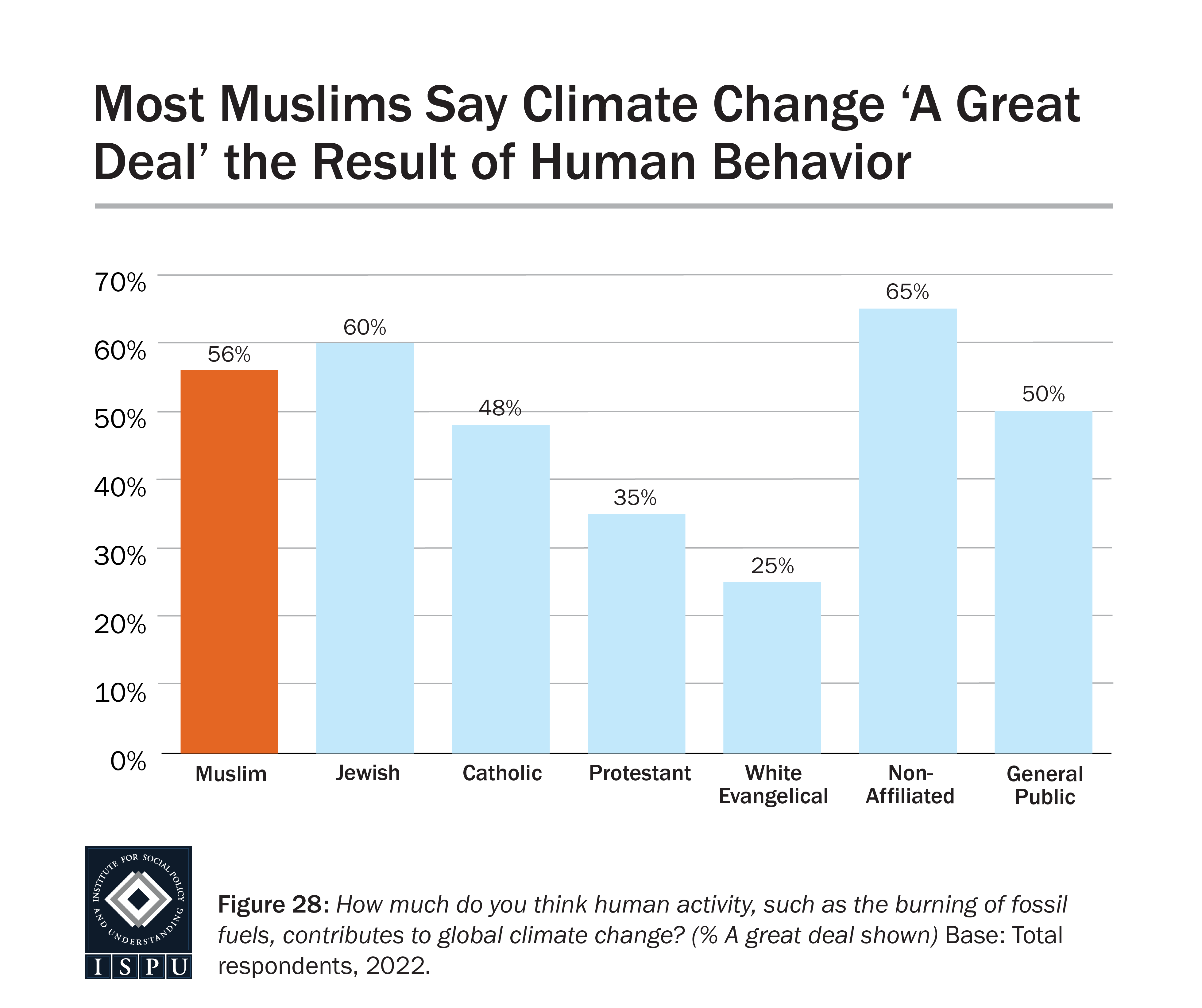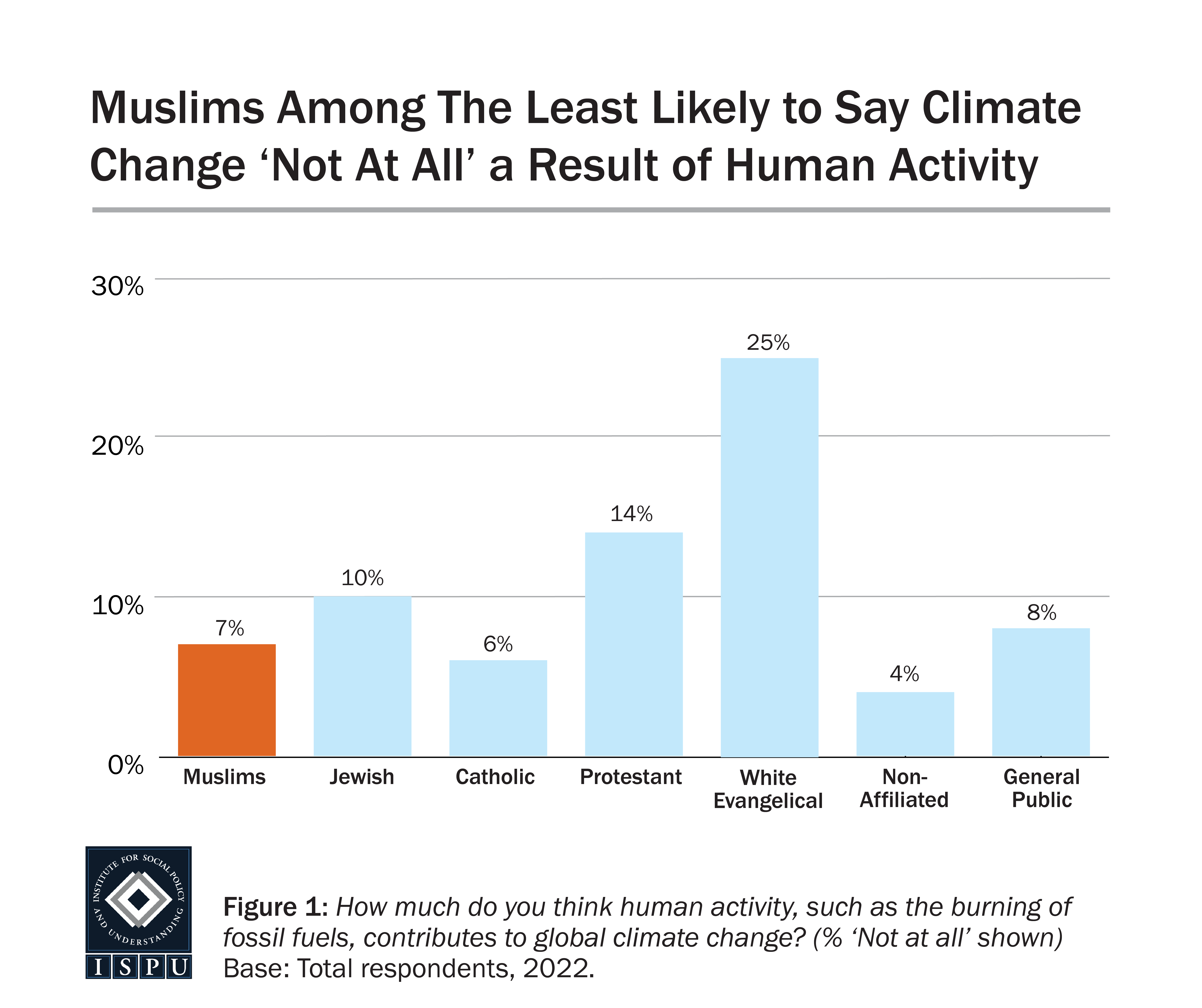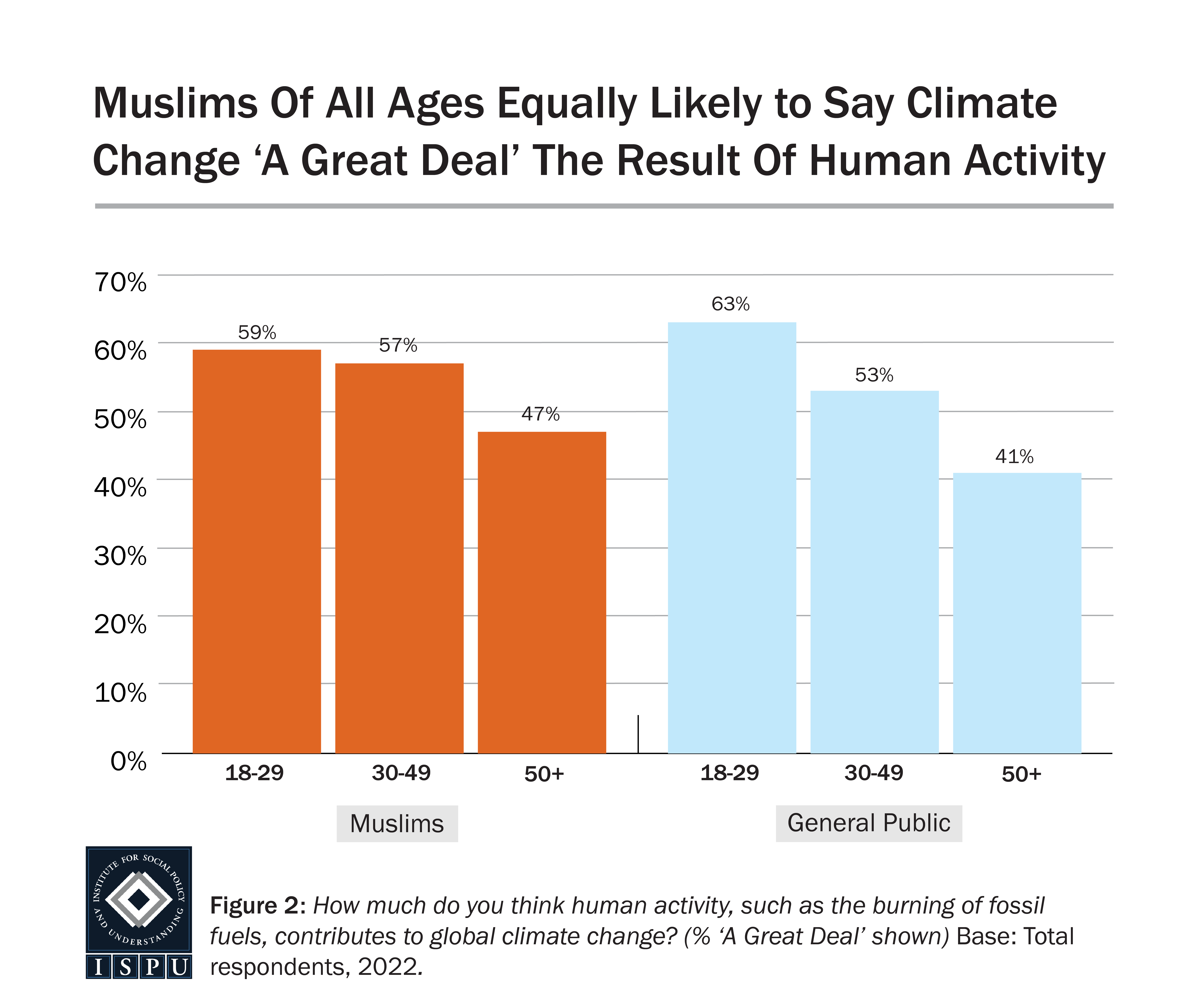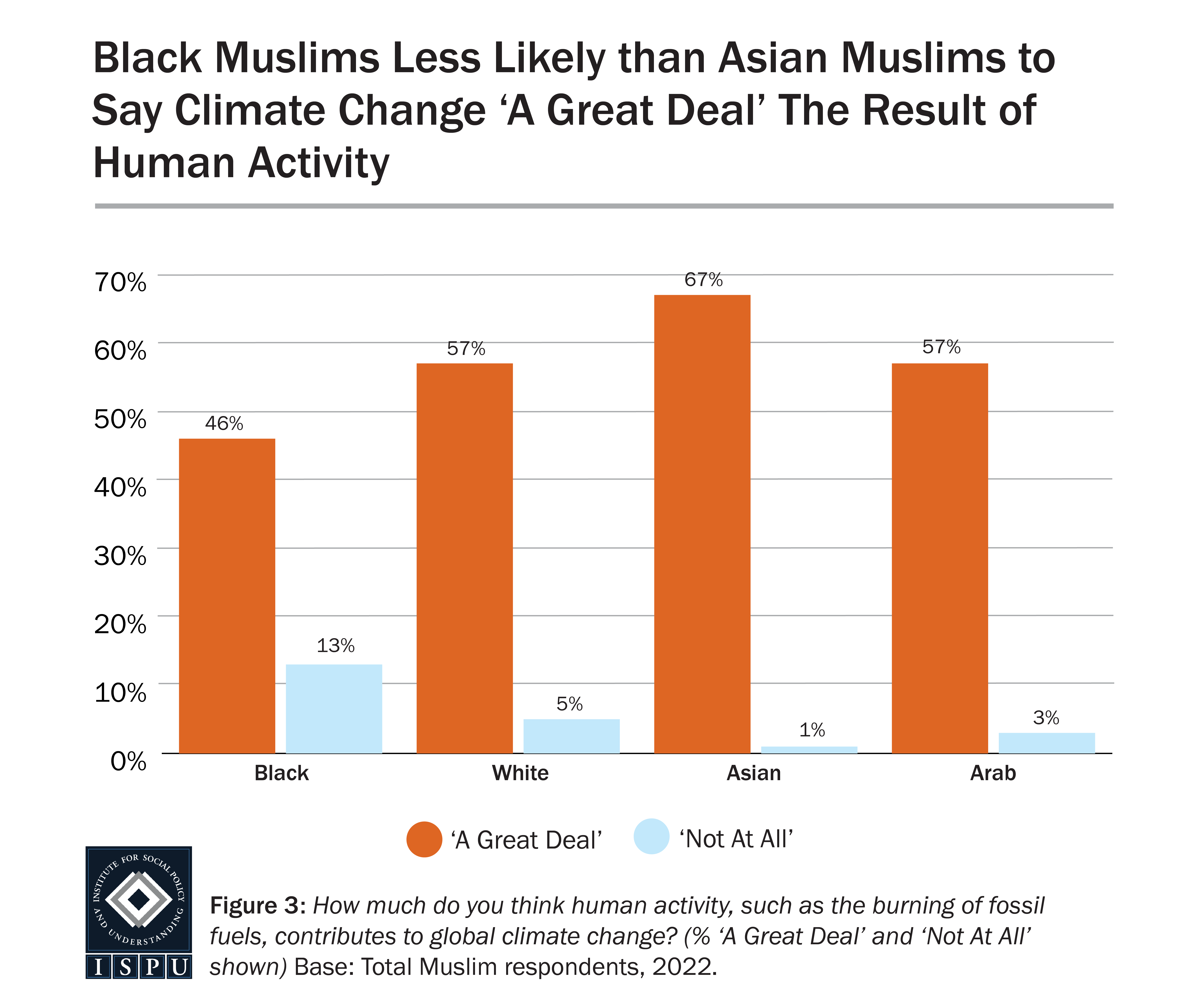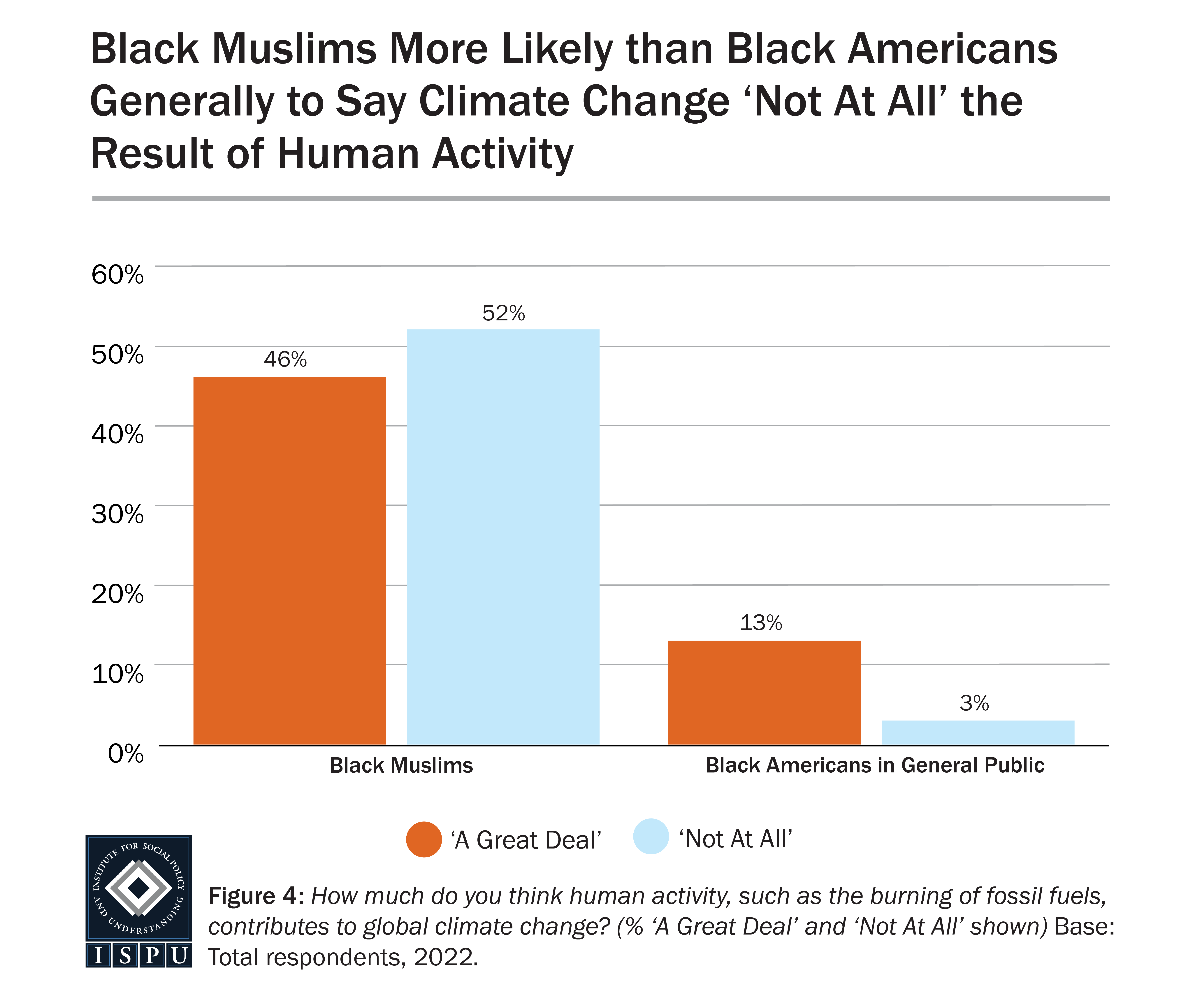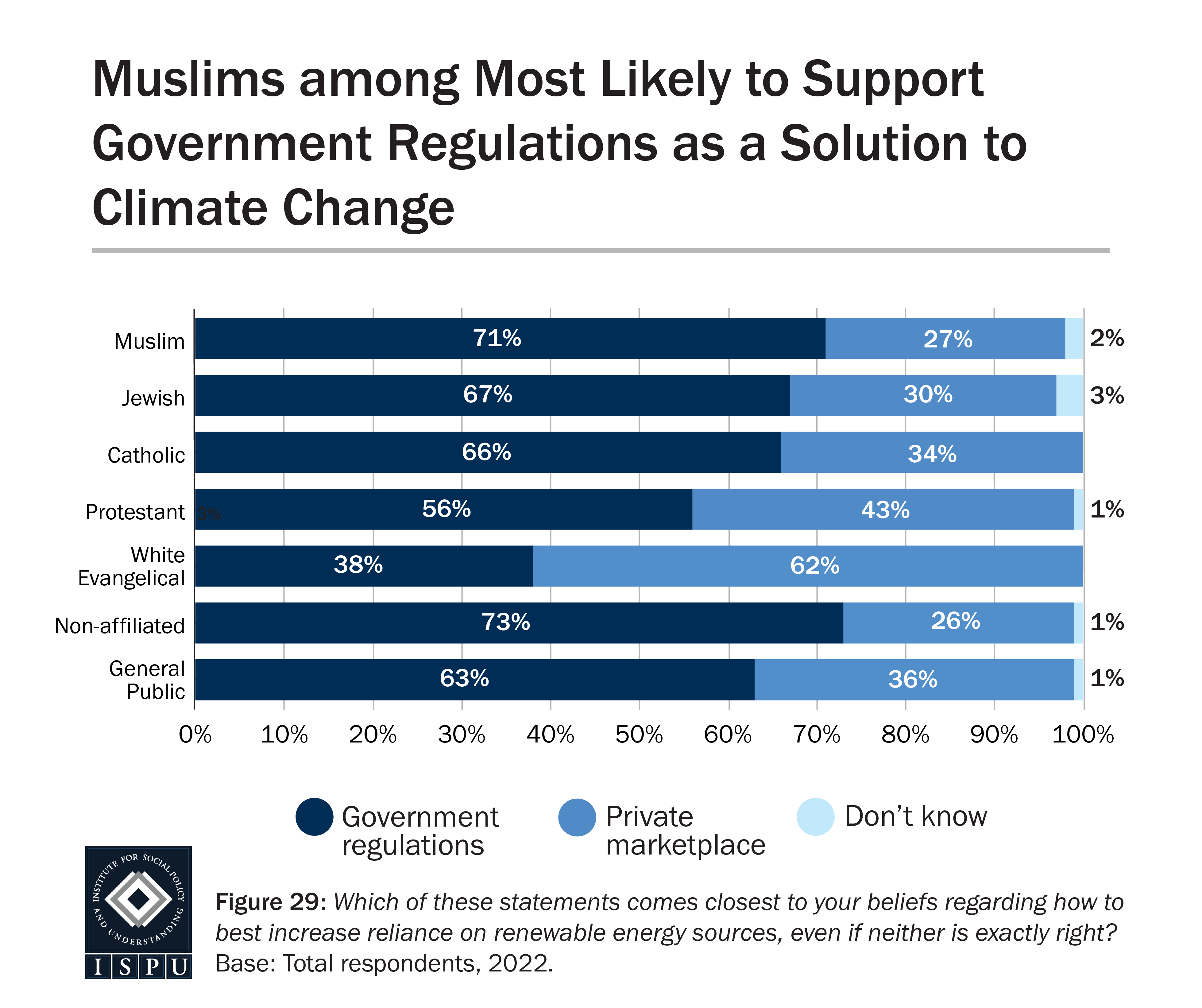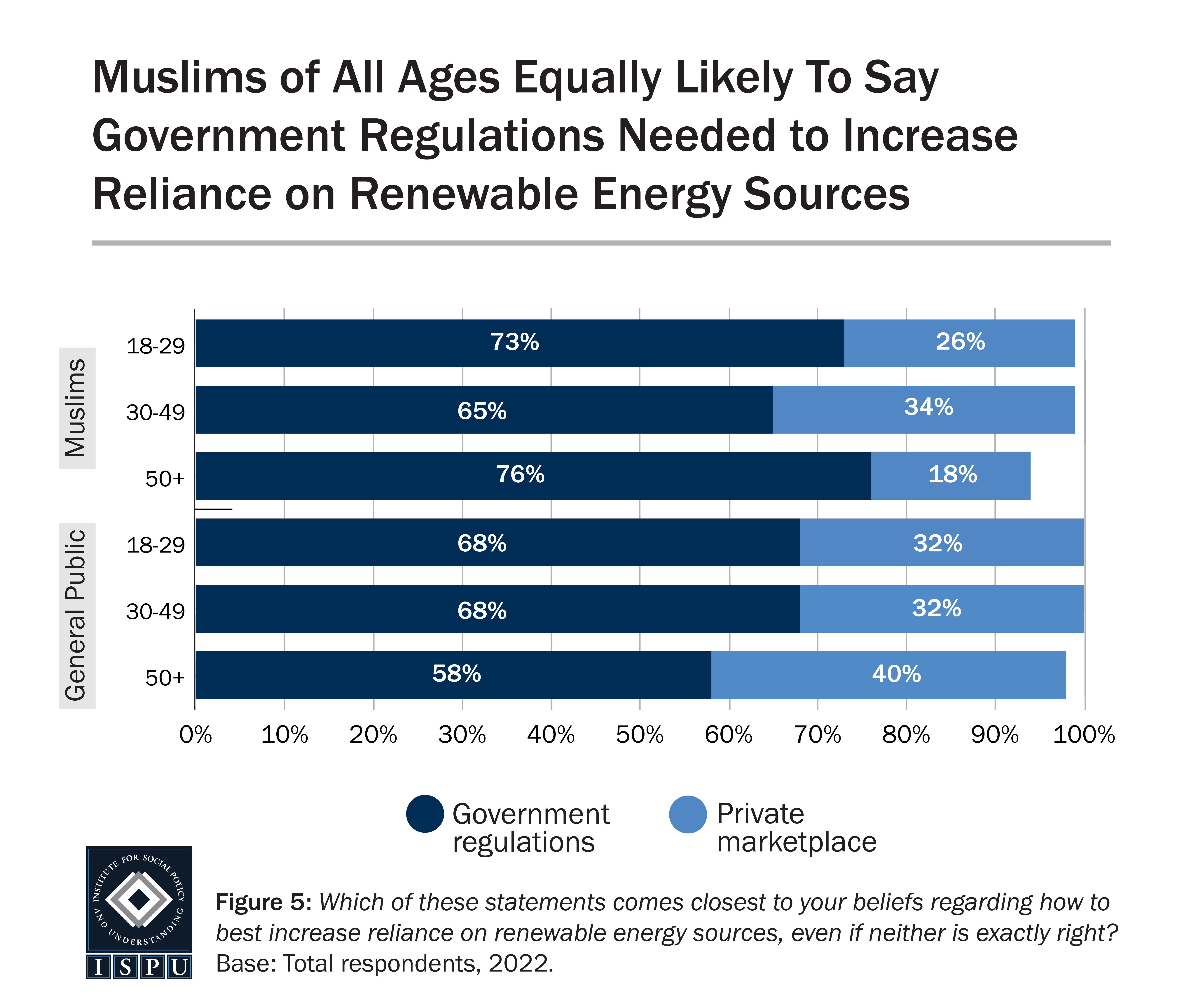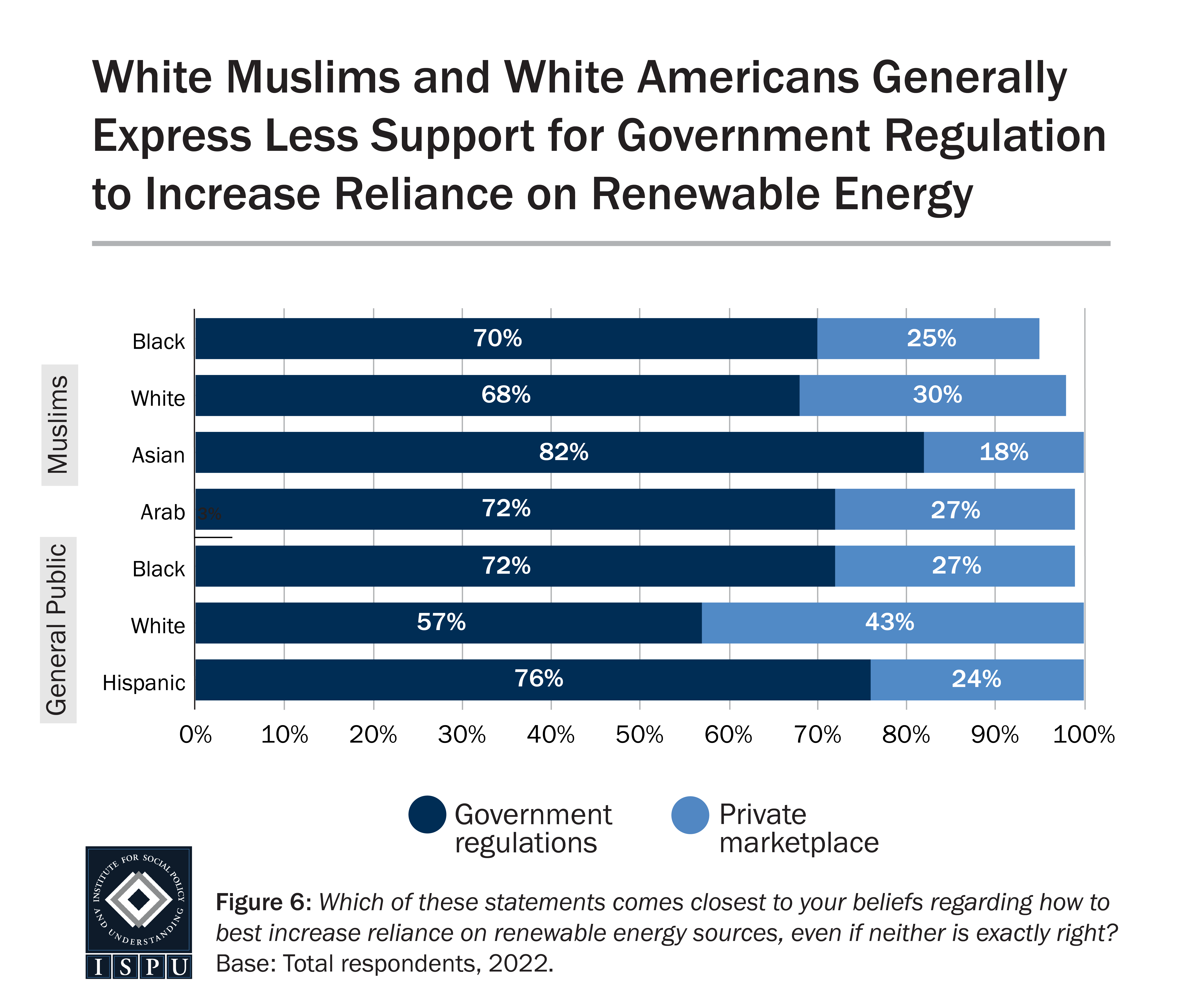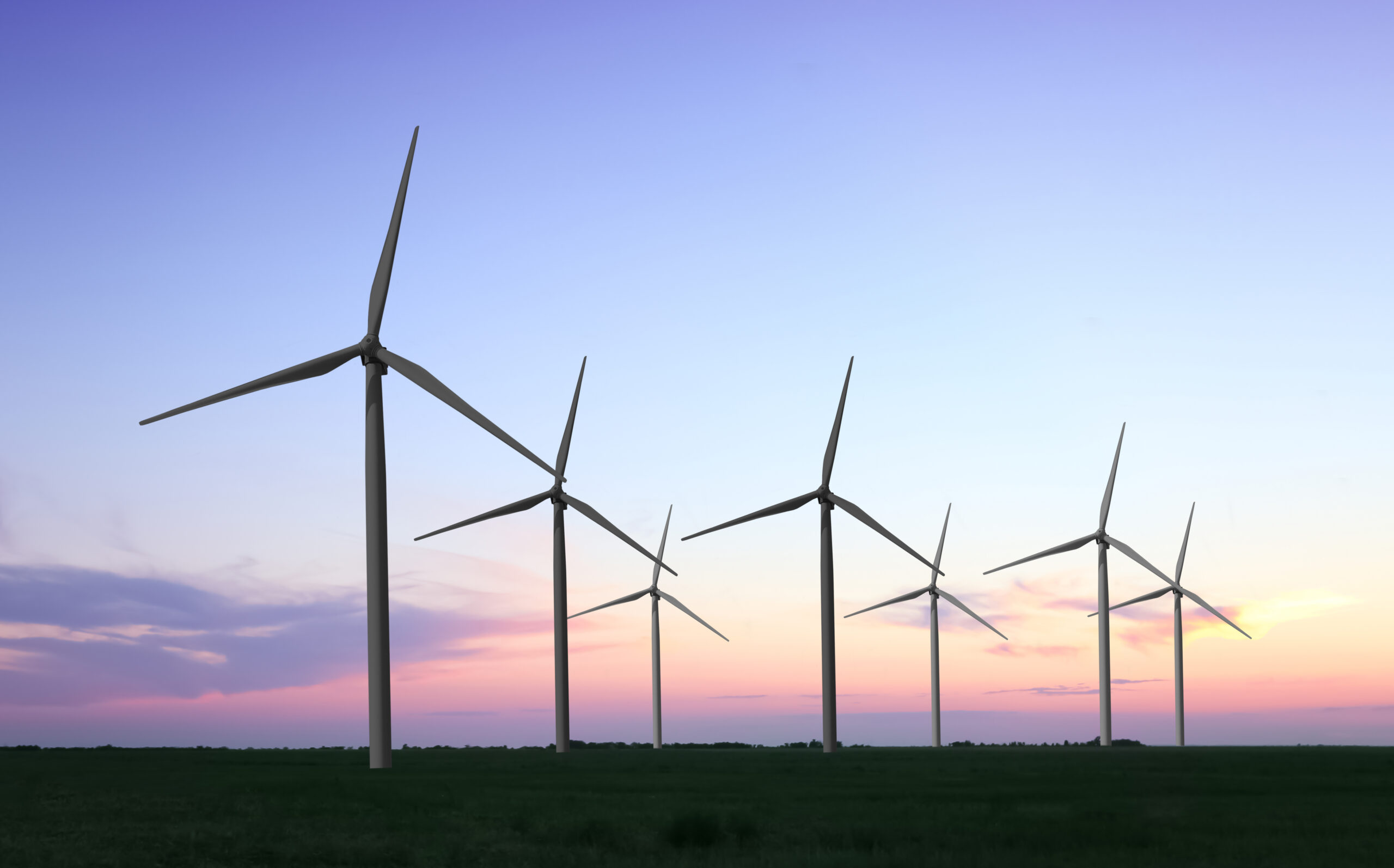
The Majority of American Muslims Believe that Climate Change is the Result of Human Behavior and that Government Regulation is a Way to Solve for it
January 20, 2023 | BY MEIRA NEGGAZ, DALIA MOGAHED, AND ERUM IKRAMULLAH
For decades, the issue of climate change has been a hotly debated topic, one that has figured prominently in the political arena and the public square. Over this time, Americans’ acceptance of the idea of climate change along with their behavior has evolved. Access to energy-efficient products has grown, alternative energies have become more mainstream, and everything from reusable bags to recycling have become the norm.
In recent years, through the present day, climate change and environmental issues more broadly have been front and center. Extreme heat, wildfires, drought, and hurricanes have dominated the news as has migration, both internal and international, from affected regions. Study after study shows there is a limited amount of time to address climate change trends before the impact becomes dire and irreversible. Climate activists maintain the conversation in the public square and push for change. In June 2022, the Supreme Court issued a ruling limiting the power of the Environmental Protection Agency (EPA) to put state-level caps on carbon emissions under the 1970 Clean Air Act, instead giving this authority to Congress. Just a month later, the Inflation Reduction Act was signed into law by President Biden, creating tax credits, incentives, and other provisions intended to help companies tackle climate change, enhance energy efficiency, and increase investments in renewable energy. And the UN Climate Change Conference took place on the world stage, where experts released a report calling most corporate and civic pledges to hit net-zero emissions little more than “greenwashing,” challenging companies, banks, and cities to adhere to a harder set of net-zero standards.
So, how do Muslims, alongside other American faith and non-faith communities, view the issue? What do they believe has caused climate change? And how do they think we can solve for it? In March 2022, the Institute for Social Policy and Understanding (ISPU), set out to explore this issue by asking the following questions in our landmark American Muslim Poll:
How much do you think that human activity, such as the burning of fossil fuels, contributes to global climate change?
-
- Not at all
- A little
- Some
- A great deal
Which of these statements comes closest to your beliefs regarding how to best increase reliance on renewable energy sources, even if neither is exactly right?
-
- Government regulations are necessary to encourage businesses and consumers to rely more on renewable energy sources
- The private marketplace will ensure that businesses and consumers rely more on renewable energy sources, even without government regulations
This analysis originally appeared in American Muslim Poll 2022: A Politics and Pandemic Status Report. We’re expanding on the original analysis with additional graphs and context given the heightened discussions on climate change.
As we dive into the findings, it is important to remember that Muslims are incredibly diverse, with a majority hailing from communities of color, who are disproportionately impacted by climate change. Muslims are also the most likely group measured to live on a household income of less than $30,000 per year, creating challenges in protecting from, dealing with, and bouncing back from climate disasters. And, Muslims are a young faith group, with just over 25% between the ages of 18-24, an age group who will bear the brunt of the effects of climate change into the future. And, although most Muslims favor government regulation to increase reliance on renewable energy, Muslims are the most likely faith group we studied to face obstacles to voting. Nearly half of Muslims had faced an obstacle to voting, like long lines, voter ID requirements, or intimidation, compared to less than one quarter of all other groups. And young Muslims are most likely among Muslims to experience these obstacles, at 55%.
MORE ANALYSES
The Majority of American Muslims Believe Abortion Should be Legal in All or Most Cases
Black Muslims and Younger Muslims Least Likely to Be Vaccinated
Substance Abuse and Addiction in the Muslim Community
The (Dis)parity of White Muslim Political Attitudes
American Muslim Policy Priorities
Five Surprising Facts about Divorce in American Muslim Communities
Not Immune: Some Muslims in America Internalize Islamophobia

The Majority of American Muslims Believe that Climate Change is the Result of Human Behavior and that Government Regulation is a Way to Solve for it
January 20, 2023 | BY MEIRA NEGGAZ, DALIA MOGAHED, AND ERUM IKRAMULLAH
For decades, the issue of climate change has been a hotly debated topic, one that has figured prominently in the political arena and the public square. Over this time, Americans’ acceptance of the idea of climate change along with their behavior has evolved. Access to energy-efficient products has grown, alternative energies have become more mainstream, and everything from reusable bags to recycling have become the norm.
In recent years, through the present day, climate change and environmental issues more broadly have been front and center. Extreme heat, wildfires, drought, and hurricanes have dominated the news as has migration, both internal and international, from affected regions. Study after study shows there is a limited amount of time to address climate change trends before the impact becomes dire and irreversible. Climate activists maintain the conversation in the public square and push for change. In June 2022, the Supreme Court issued a ruling limiting the power of the Environmental Protection Agency (EPA) to put state-level caps on carbon emissions under the 1970 Clean Air Act, instead giving this authority to Congress. Just a month later, the Inflation Reduction Act) was signed into law by President Biden, creating tax credits, incentives, and other provisions intended to help companies tackle climate change, enhance energy efficiency, and increase investments in renewable energy. And the UN Climate Change Conference took place on the world stage, where experts released a report calling most corporate and civic pledges to hit net-zero emissions little more than “greenwashing,” challenging companies, banks, and cities to adhere to a harder set of net-zero standards.
So, how do Muslims, alongside other American faith and non-faith communities, view the issue? What do they believe has caused climate change? And how do they think we can solve for it? In March 2022, the Institute for Social Policy and Understanding (ISPU), set out to explore this issue by asking the following questions in our landmark American Muslim Poll:
How much do you think that human activity, such as the burning of fossil fuels, contributes to global climate change?
-
- Not at all
- A little
- Some
- A great deal
Which of these statements comes closest to your beliefs regarding how to best increase reliance on renewable energy sources, even if neither is exactly right?
-
- Government regulations are necessary to encourage businesses and consumers to rely more on renewable energy sources
- The private marketplace will ensure that businesses and consumers rely more on renewable energy sources, even without government regulations
This analysis originally appeared in American Muslim Poll 2022: A Politics and Pandemic Status Report. We’re expanding on the original analysis with additional graphs and context given the heightened discussions on climate change.
As we dive into the findings, it is important to remember that Muslims are incredibly diverse, with a majority hailing from communities of color, who are disproportionately impacted by climate change. Muslims are also the most likely group measured to live on a household income of less than $30,000 per year, creating challenges in protecting from, dealing with, and bouncing back from climate disasters. And, Muslims are a young faith group, with just over 25% between the ages of 18-24, an age group who will bear the brunt of the effects of climate change into the future. And, although most Muslims favor government regulation to increase reliance on renewable energy, Muslims are the most likely faith group we studied to face obstacles to voting. Nearly half of Muslims had faced an obstacle to voting, like long lines, voter ID requirements, or intimidation, compared to less than one quarter of all other groups. And young Muslims are most likely among Muslims to experience these obstacles, at 55%.
Muslims are among the most likely to see climate change as the result of human behavior
-
- Muslims are among the most likely to attribute climate change to human activity. More than half of Muslims (56%), along with 60% of Jews, 48% of Catholics, and 65% of the nonaffiliated see climate change as ‘a great deal’ the result of human behavior, compared with 35% of Protestants and 25% of white Evangelicals.
- Half of the general public (50%) says climate change is ‘a great deal’ the result of human behavior, slightly less likely than American Muslims.
- Men and women of all groups are equally likely to hold this view.
- On the flip side, just 7% of Muslims hold the view that climate change is ‘not at all’ the result of human behavior. This is similar to 10% of Jews, 6% of Catholics, 14% of Protestants, 4% of the nonaffiliated, and 8% of the general public. White Evangelicals are most likely to hold this view, with one quarter (25%) believing it to be the case.
Muslims of all ages are equally likely to see climate change as the result of human behavior
-
- Among American Muslims, all age groups were equally likely to express that climate change is ‘a great deal’ the result of human behavior (59% of 18-29-year-olds, 57% of 30-49-year-olds, and 47% of 50+-year-olds).
- Among the general public, however, the oldest (50+-year-olds) were less likely than younger age groups to hold this view (41% of 50+-year-olds vs. 63% of 18-29-year-olds and 53% of 30-49-year-olds).
For Muslims, beliefs around the causes of climate change differ some by race and ethnicity
-
- Looking at the data by race/ethnicity among American Muslims, we find Black Muslims are less likely than Asian Muslims to believe climate change is ‘a great deal’ the result of human behavior (46% vs. 67%, respectively). More than half (57%) of both white and Arab Muslims hold this view.
- Black Muslims are more likely than white and Asian Muslims to believe climate change is ‘not at all’ the result of human behavior (13% vs. 5% and 1%, respectively). Three percent of Arab Muslims believe climate change is unrelated to human behavior.
- When comparing between Muslims and the general public, Black Muslims are as likely as Black Americans in the general public to believe climate change is ‘a great deal’ related to human behavior (46% and 52%, respectively); however, Black Muslims are more likely than Black Americans in the general public to believe climate change is ‘not at all’ related to human behavior (13% vs. 3%, respectively).
Muslims are among the most likely group to favor government regulation to curb the impacts of climate change
-
- When it comes to solutions to climate change, we find a similar pattern as found above about the causes of climate change. Specifically, Muslims are among the most supportive of government regulations to encourage reliance on renewable energy (71%), on par with roughly two-thirds of both Jews and Catholics.
- On the other hand, 56% of Protestants, 38% of white Evangelicals, and 63% of the general public believe that government regulations encouraging reliance on renewable energy are the solution to climate change.
- At 62%, white Evangelicals are most likely to believe the private marketplace is the solution to encourage reliance on renewable energy sources.
Muslims of all ages are equally likely to believe government regulations are needed
-
- Americans Muslims of all ages are equally likely to believe that government regulations are needed to increase reliance on renewable energy sources. However, the oldest Muslims (50+ years old) are more likely than their age counterparts in the general public to hold this view (76% of 50+-year-old Muslims vs. 58% of 50+-year-olds in the general public).
- American Muslims aged 30-49 are more likely than 50+-year-old Muslims to believe the private marketplace will ensure reliance on renewable energy (34% vs. 18%, respectively).
For Muslims, beliefs around government regulation to increase reliance on renewable energy differ by race and ethnicity
-
- Looking by race, we find Asian Muslims are more likely than white Muslims to believe in government regulations to encourage reliance on renewable energy (82% vs. 68%, respectively), while white Muslims are more likely than Asians Muslims to believe the private marketplace can mitigate the impact of climate change (30% vs. 18%).
- Among the general public, white Americans (57%) are less likely than Black (72%) and Hispanic (76%) Americans to believe in government regulations as a solution to climate change and are more likely to support the private marketplace as a solution (43% of white Americans vs. 27% of Black and 24% of Hispanic Americans).
- White Muslims are more likely than white Americans in the general public to support government regulation (68% vs. 57%, respectively).
About ISPU’s American Muslim Poll:
Now in its sixth iteration, ISPU’s American Muslim Poll captures a snapshot of American Muslim experiences in all their diversity, as well as tracking trends over time. The survey not only polls Americans who are Muslim, but Americans of other faiths and no faith. This allows readers to understand American Muslims’ perspective within the context of their nation’s faith landscape, not as an isolated specimen.
(Note: Due to rounding, some totals don’t correspond with the sum of the individual figures)
About the authors:

Meira Neggaz is the Executive Director of ISPU, where she is responsible for the institution’s overall leadership, strategy, and growth. Learn more about Meira→
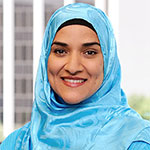
Dalia Mogahed is the Director of Research at the Institute for Social Policy and Understanding, where she leads the organization’s pioneering research and thought leadership programs on American Muslims. Learn more about Dalia→

Erum Ikramullah is a Research Project Manager at ISPU, where she manages the day-to-day activities of the organization’s research studies. Learn more about Erum→


